
sola-application
AI Voice Assistant for Solana
Stars: 52
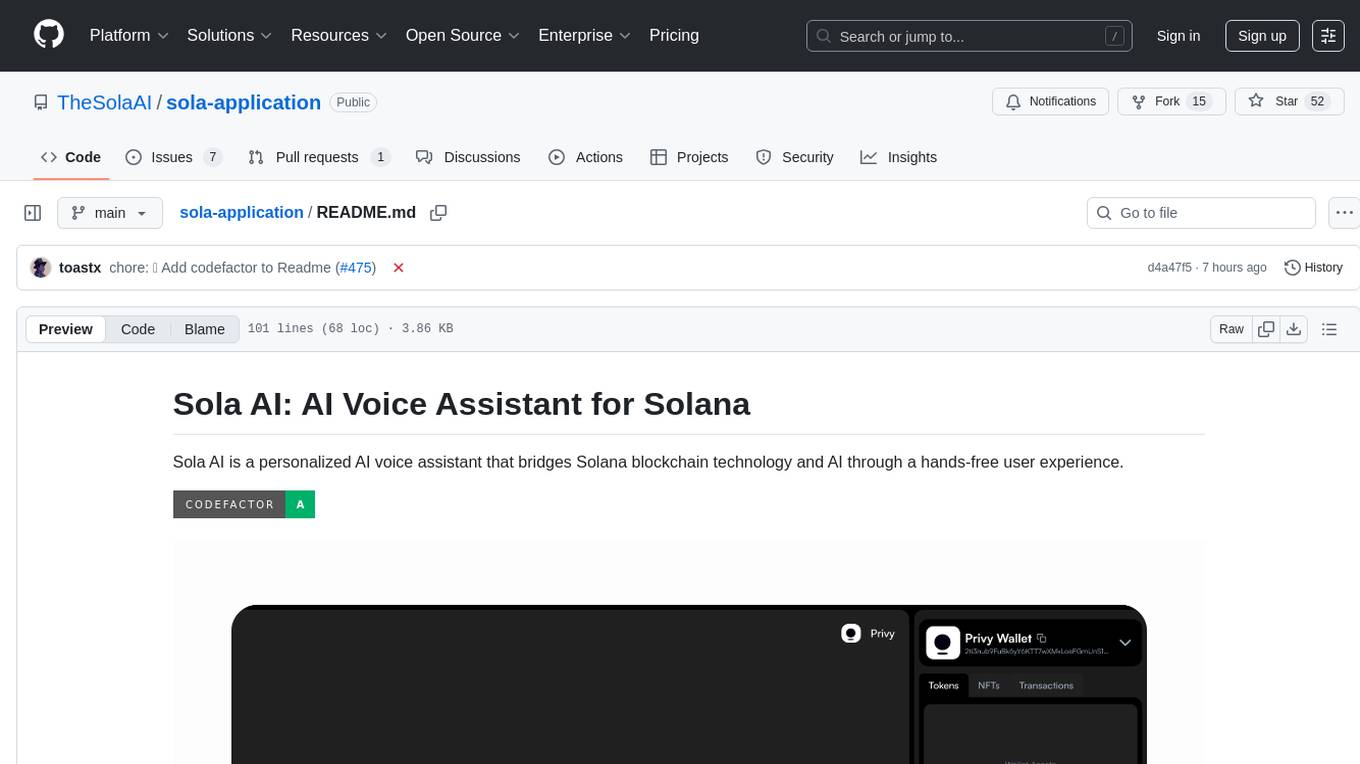
Sola AI is a personalized AI voice assistant that integrates Solana blockchain technology and AI through a hands-free user experience. It provides real-time communication using WebRTC, modern frontend built with Next.js and Tailwind CSS, scalable backend with microservices architecture, blockchain data filtering, and supports Solana on-chain interactions. Core components include Sola AI Application for user input processing, OpenAI integration, microservices routing, and AI-powered intelligent interface. It also includes Data Service for blockchain data processing, Wallet Service for transaction handling, and User Service for managing user data. The workflow involves receiving user input, fetching and filtering blockchain data, building transactions, executing transactions, and responding to the user. Installation involves cloning the repository, installing dependencies, setting up environment variables, and starting the development server.
README:
Sola AI is a personalized AI voice assistant that bridges Solana blockchain technology and AI through a hands-free user experience.
This application provides seamless interaction between the user, OpenAI, and blockchain data using voice and text. Key features include:
- Real-time Communication: Utilizes WebRTC for seamless voice and text communication.
- Modern Frontend: Built with Next.js and styled with Tailwind CSS.
- Scalable Backend: Employs a microservices architecture for efficient data processing.
- Blockchain Data Filtering: Microservices filter and process blockchain data based on user queries.
- Blockchain Interactions: Supports Solana on-chain interactions (e.g., transfer, swap).
-
Sola AI Application: Serves as the central hub for processing user input, communicating with services, and integrating AI models with blockchain interactions.
- Interfaces with OpenAI for natural language processing.
- Routes user requests to appropriate microservices.
- Provides AI powered intelligent interface.
-
Data Service:
- Microservice providing blockchain data built using rust.
- Filters and structures Solana blockchain and web data based on user queries.
-
Wallet Service:
- Helps to build pre-defined transactions and provides transaction objects.
- Built using Rust for fast data processing.
-
User Service:
- Manages user data such as chat rooms management, chat history, user settings.
Refer our Docs for a better understanding of the application architecture.
- User Input: Sola AI receives voice or text input.
- Data Fetching: The Data Service retrieves and filters blockchain data.
- Transaction Building: The Wallet Service handles transaction construction.
- Transaction Execution: The transaction is executed using an embedded wallet or the user's custom wallet.
- Response: Sola AI processes the results and responds to the user through the voice/text interface.
- Clone the repository
- Install dependencies with
yarn install - Set up your environment variables (see below)
- Start the development server with
yarn dev
Create a .env file in the root directory with the following variables:
# Authentication (Privy)
NEXT_PUBLIC_PRIVY_APP_ID=cm5lc4euv00c5kmrbpu9oj0u4
PRIVY_VERIFICATION_KEY=
PRIVY_APP_SECRET=
# Database
DATABASE_URL=
# OpenAI
OPENAI_API_KEY=
# Solana
NEXT_PUBLIC_SOLANA_RPC=
SOLANA_RPC_URL=
SOLANA_PRIVATE_KEY=
# Microservices
NEXT_PUBLIC_AUTH_SERVICE_URL=https://user-service.solaai.tech/api/v1/
NEXT_PUBLIC_DATA_SERVICE_URL=https://data-stream-service.solaai.tech/
NEXT_PUBLIC_WALLET_SERVICE_URL=https://wallet-service.solaai.tech/For detailed installation instructions, please refer to the INSTALL.md file.
We welcome contributions! To contribute:
- Fork the repository and create a new branch.
- Make your changes and test thoroughly.
- Submit a pull request with detailed explanations of your changes.
Please see the CONTRIBUTING.md file for more guidelines.
This project is licensed under the GNU General Public License v3.0. See the LICENSE file for details.
For Tasks:
Click tags to check more tools for each tasksFor Jobs:
Alternative AI tools for sola-application
Similar Open Source Tools

sola-application
Sola AI is a personalized AI voice assistant that integrates Solana blockchain technology and AI through a hands-free user experience. It provides real-time communication using WebRTC, modern frontend built with Next.js and Tailwind CSS, scalable backend with microservices architecture, blockchain data filtering, and supports Solana on-chain interactions. Core components include Sola AI Application for user input processing, OpenAI integration, microservices routing, and AI-powered intelligent interface. It also includes Data Service for blockchain data processing, Wallet Service for transaction handling, and User Service for managing user data. The workflow involves receiving user input, fetching and filtering blockchain data, building transactions, executing transactions, and responding to the user. Installation involves cloning the repository, installing dependencies, setting up environment variables, and starting the development server.
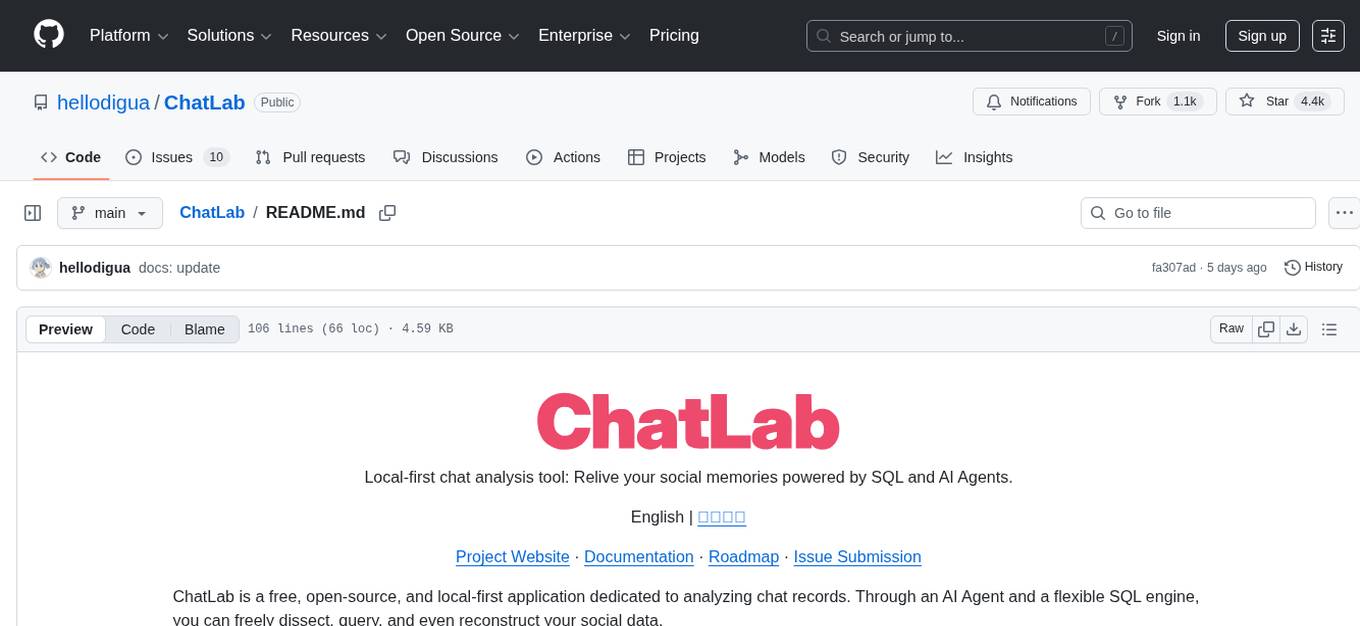
ChatLab
ChatLab is a free, open-source, and local-first application dedicated to analyzing chat records. Through an AI Agent and a flexible SQL engine, you can freely dissect, query, and even reconstruct your social data. It provides ultimate performance, privacy protection, an intelligent AI Agent, multi-dimensional data visualization, and format standardization. The tool supports chat record analysis for various platforms like LINE, WeChat, QQ, WhatsApp, Instagram, and Discord. Users can export chat records, troubleshoot, and access standardized format specifications. The system architecture includes Electron Main Process, Worker and Data Pipeline, and Rendering Process. Local development setup steps are provided for Node.js environment. Contributions are welcome following specific guidelines. Users are advised to read the Privacy Policy & User Agreement before using the software. The tool is licensed under AGPL-3.0 License.
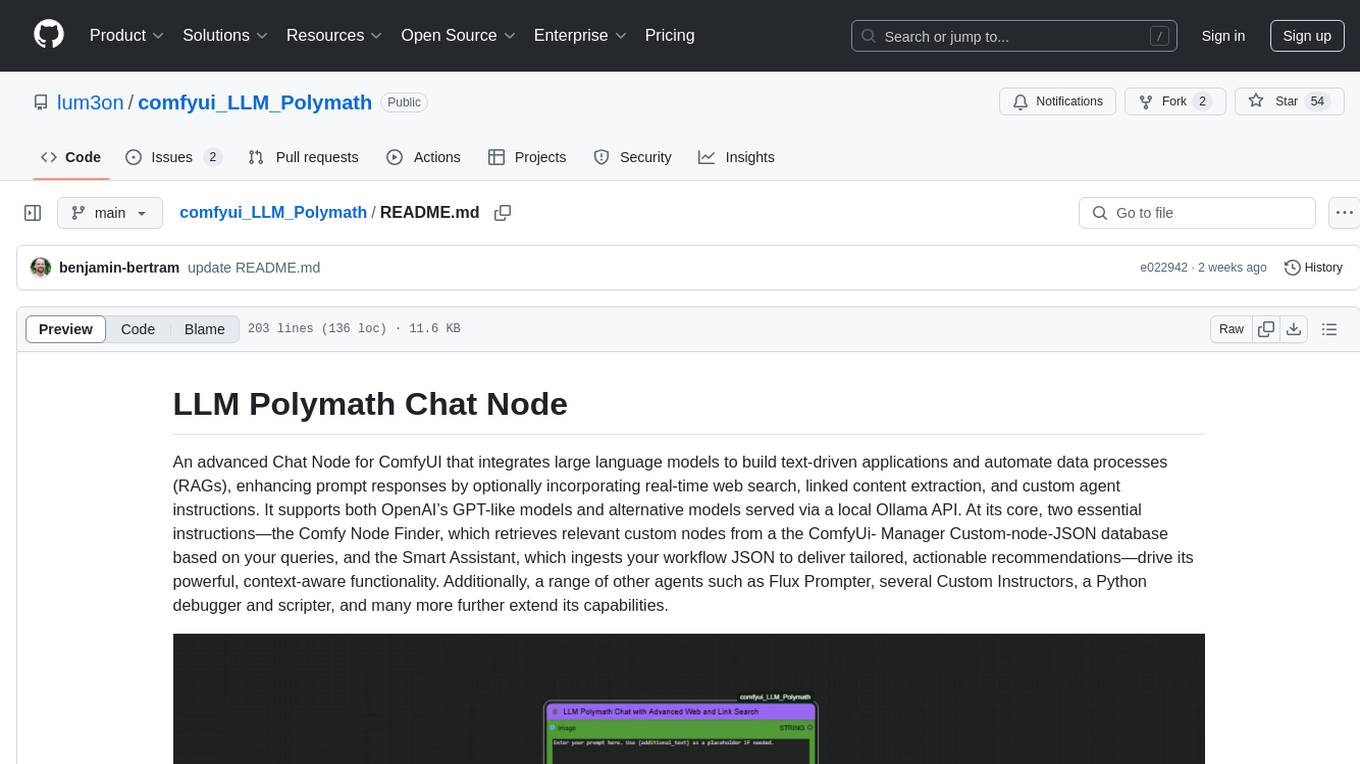
comfyui_LLM_Polymath
LLM Polymath Chat Node is an advanced Chat Node for ComfyUI that integrates large language models to build text-driven applications and automate data processes, enhancing prompt responses by incorporating real-time web search, linked content extraction, and custom agent instructions. It supports both OpenAI’s GPT-like models and alternative models served via a local Ollama API. The core functionalities include Comfy Node Finder and Smart Assistant, along with additional agents like Flux Prompter, Custom Instructors, Python debugger, and scripter. The tool offers features for prompt processing, web search integration, model & API integration, custom instructions, image handling, logging & debugging, output compression, and more.
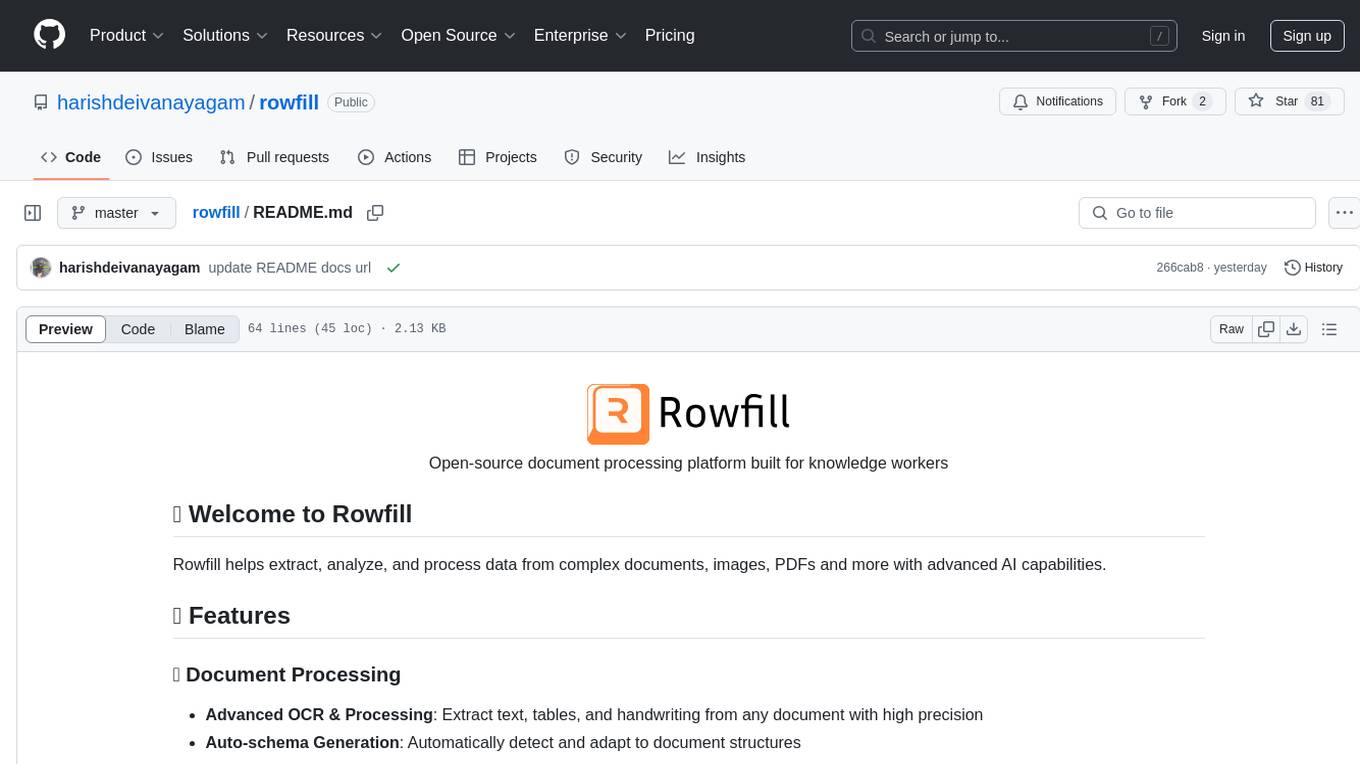
rowfill
Rowfill is an open-source document processing platform designed for knowledge workers. It offers advanced AI capabilities to extract, analyze, and process data from complex documents, images, and PDFs. The platform features advanced OCR and processing functionalities, auto-schema generation, and custom actions for creating tailored workflows. It prioritizes privacy and security by supporting Local LLMs like Llama and Mistral, syncing with company data while maintaining privacy, and being open source with AGPLv3 licensing. Rowfill is a versatile tool that aims to streamline document processing tasks for users in various industries.
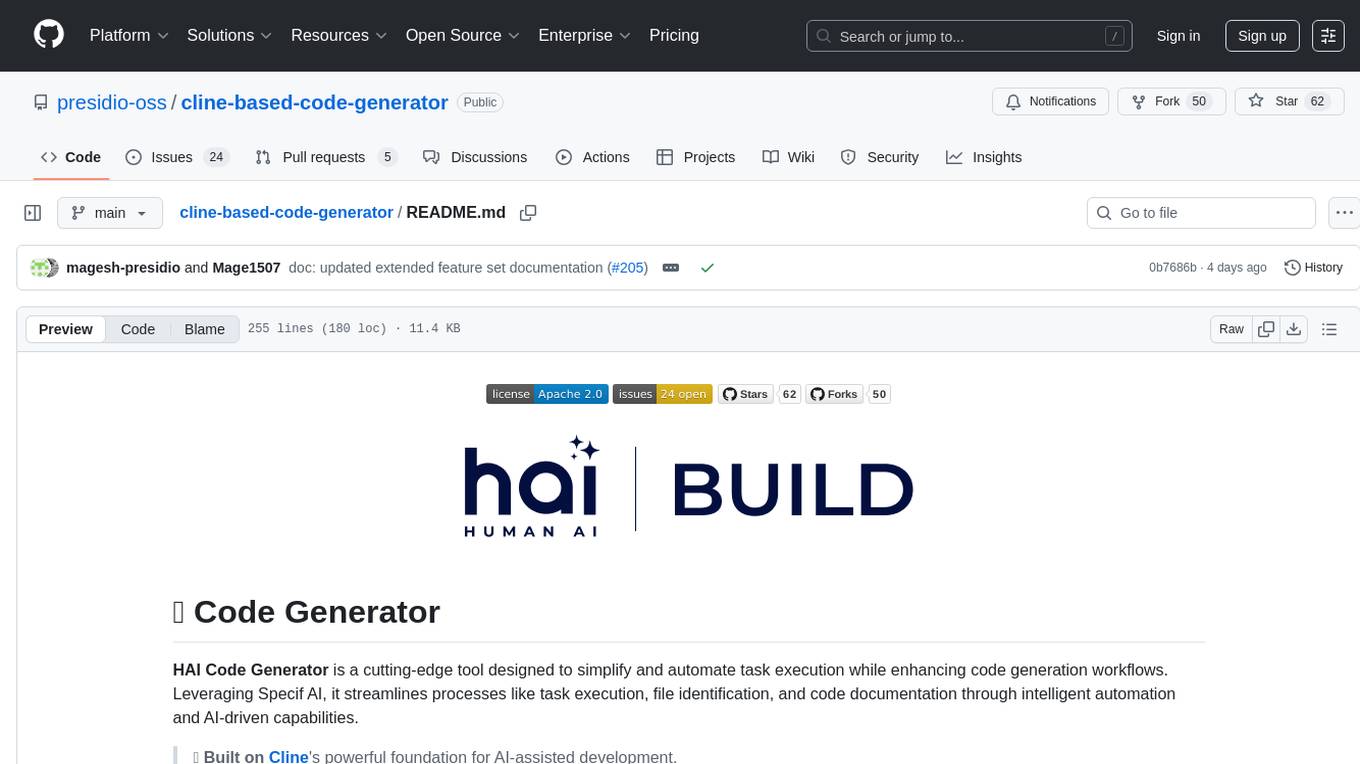
cline-based-code-generator
HAI Code Generator is a cutting-edge tool designed to simplify and automate task execution while enhancing code generation workflows. Leveraging Specif AI, it streamlines processes like task execution, file identification, and code documentation through intelligent automation and AI-driven capabilities. Built on Cline's powerful foundation for AI-assisted development, HAI Code Generator boosts productivity and precision by automating task execution and integrating file management capabilities. It combines intelligent file indexing, context generation, and LLM-driven automation to minimize manual effort and ensure task accuracy. Perfect for developers and teams aiming to enhance their workflows.
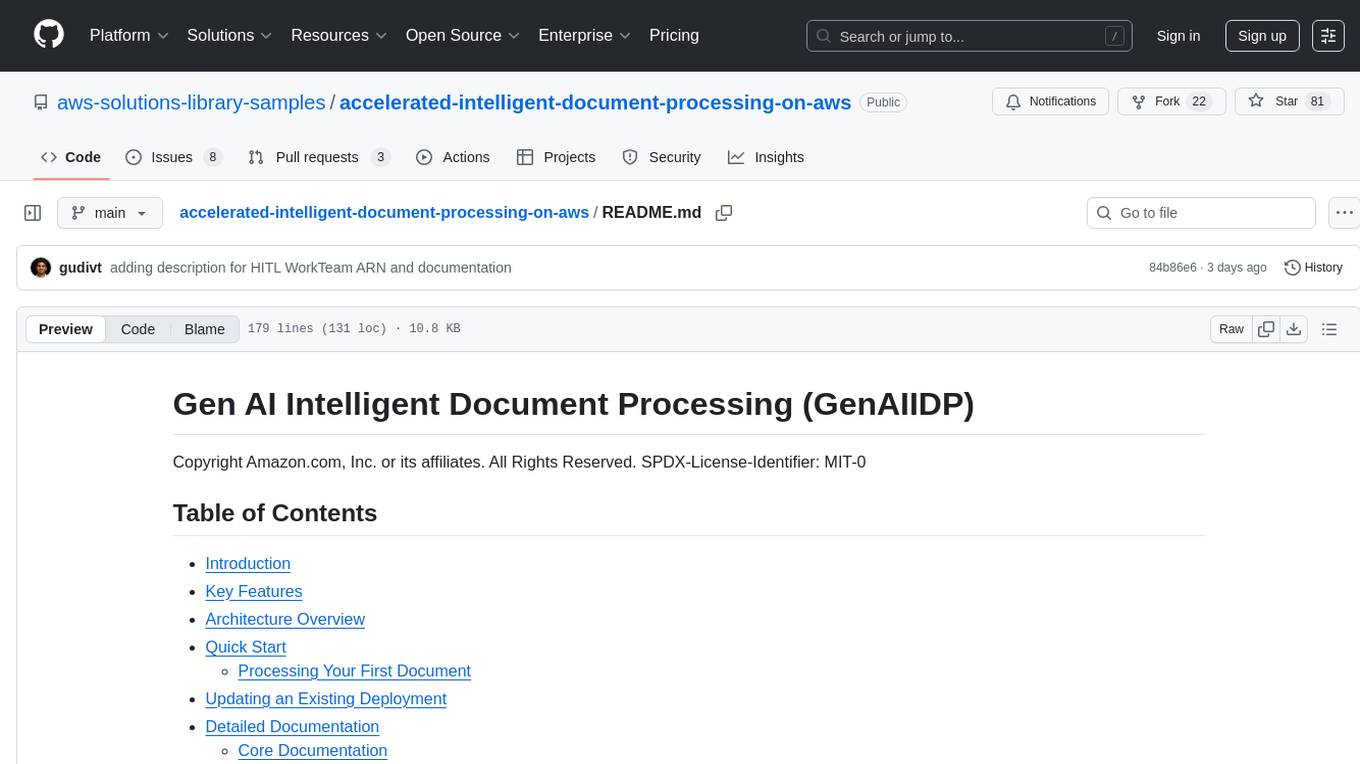
accelerated-intelligent-document-processing-on-aws
Accelerated Intelligent Document Processing on AWS is a scalable, serverless solution for automated document processing and information extraction using AWS services. It combines OCR capabilities with generative AI to convert unstructured documents into structured data at scale. The solution features a serverless architecture built on AWS technologies, modular processing patterns, advanced classification support, few-shot example support, custom business logic integration, high throughput processing, built-in resilience, cost optimization, comprehensive monitoring, web user interface, human-in-the-loop integration, AI-powered evaluation, extraction confidence assessment, and document knowledge base query. The architecture uses nested CloudFormation stacks to support multiple document processing patterns while maintaining common infrastructure for queueing, tracking, and monitoring.
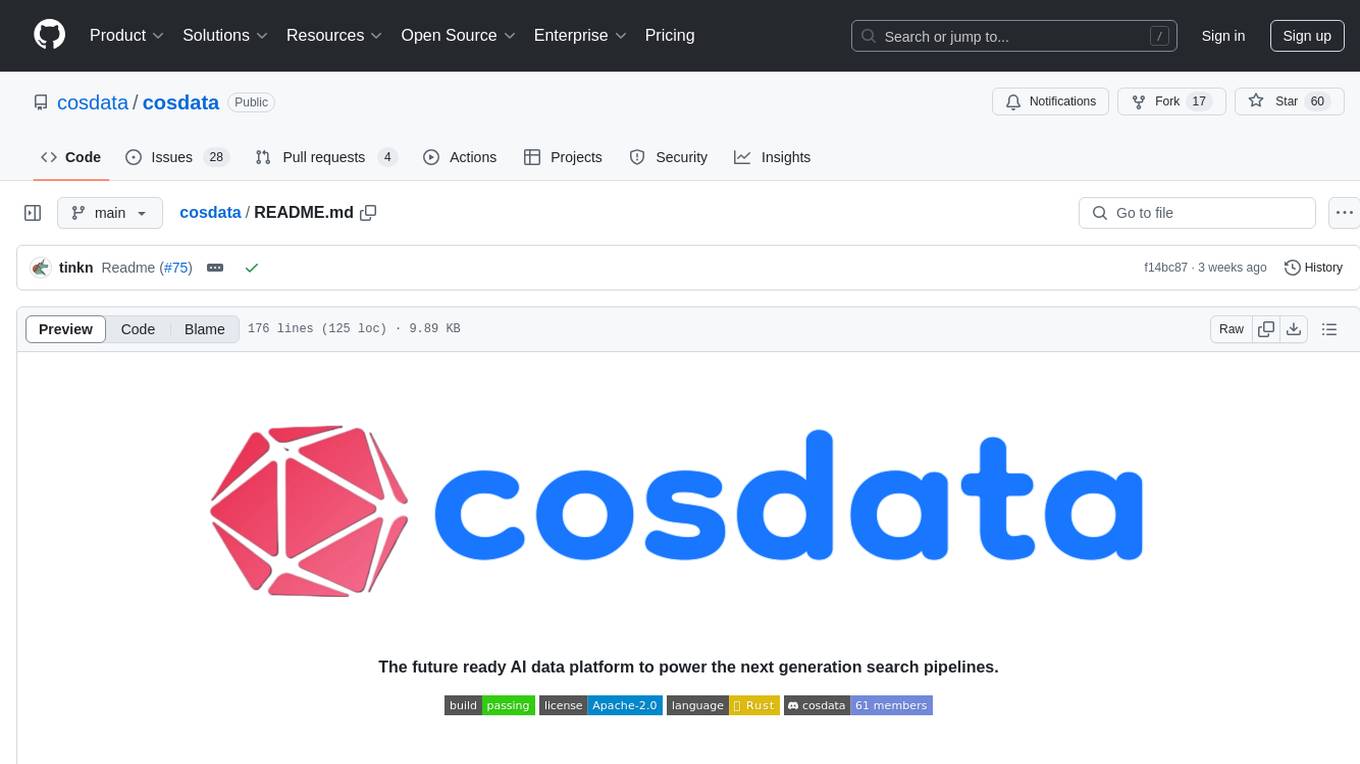
cosdata
Cosdata is a cutting-edge AI data platform designed to power the next generation search pipelines. It features immutability, version control, and excels in semantic search, structured knowledge graphs, hybrid search capabilities, real-time search at scale, and ML pipeline integration. The platform is customizable, scalable, efficient, enterprise-grade, easy to use, and can manage multi-modal data. It offers high performance, indexing, low latency, and high requests per second. Cosdata is designed to meet the demands of modern search applications, empowering businesses to harness the full potential of their data.
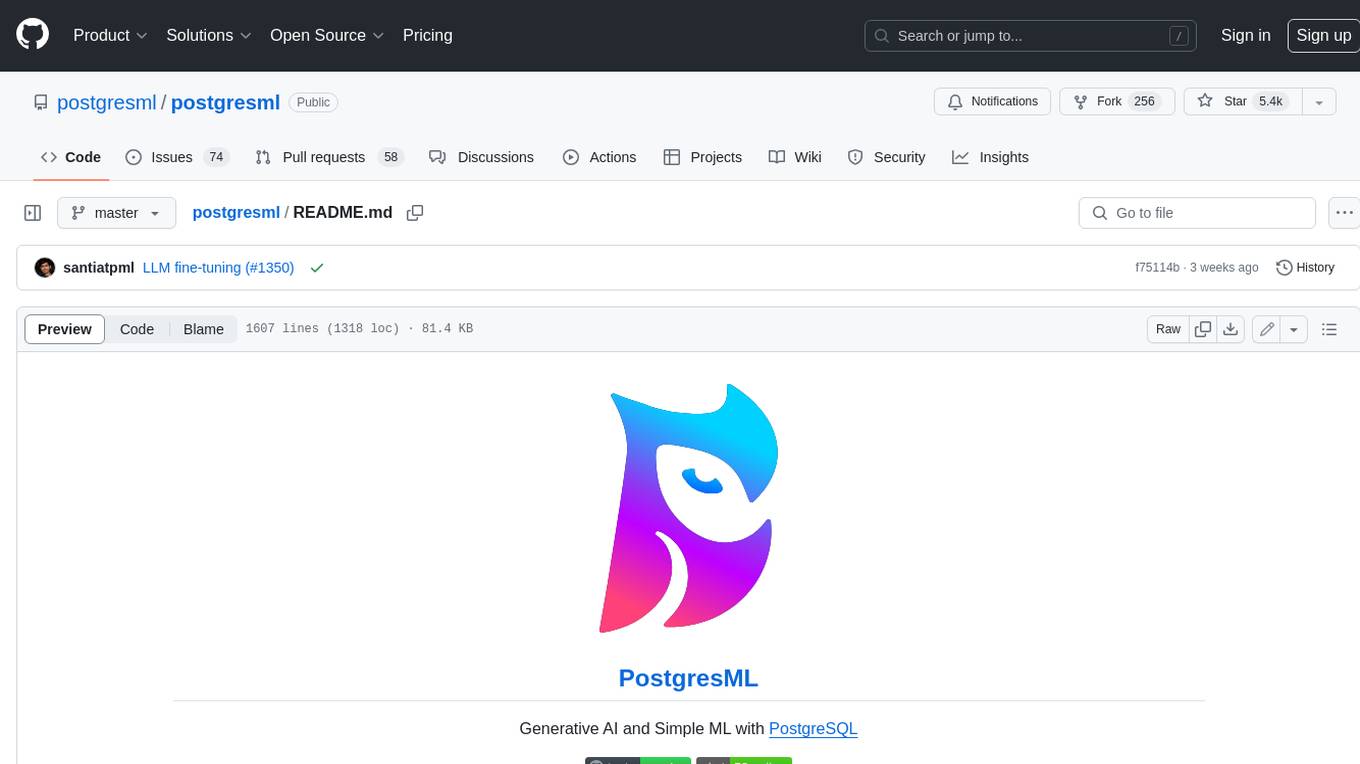
postgresml
PostgresML is a powerful Postgres extension that seamlessly combines data storage and machine learning inference within your database. It enables running machine learning and AI operations directly within PostgreSQL, leveraging GPU acceleration for faster computations, integrating state-of-the-art large language models, providing built-in functions for text processing, enabling efficient similarity search, offering diverse ML algorithms, ensuring high performance, scalability, and security, supporting a wide range of NLP tasks, and seamlessly integrating with existing PostgreSQL tools and client libraries.
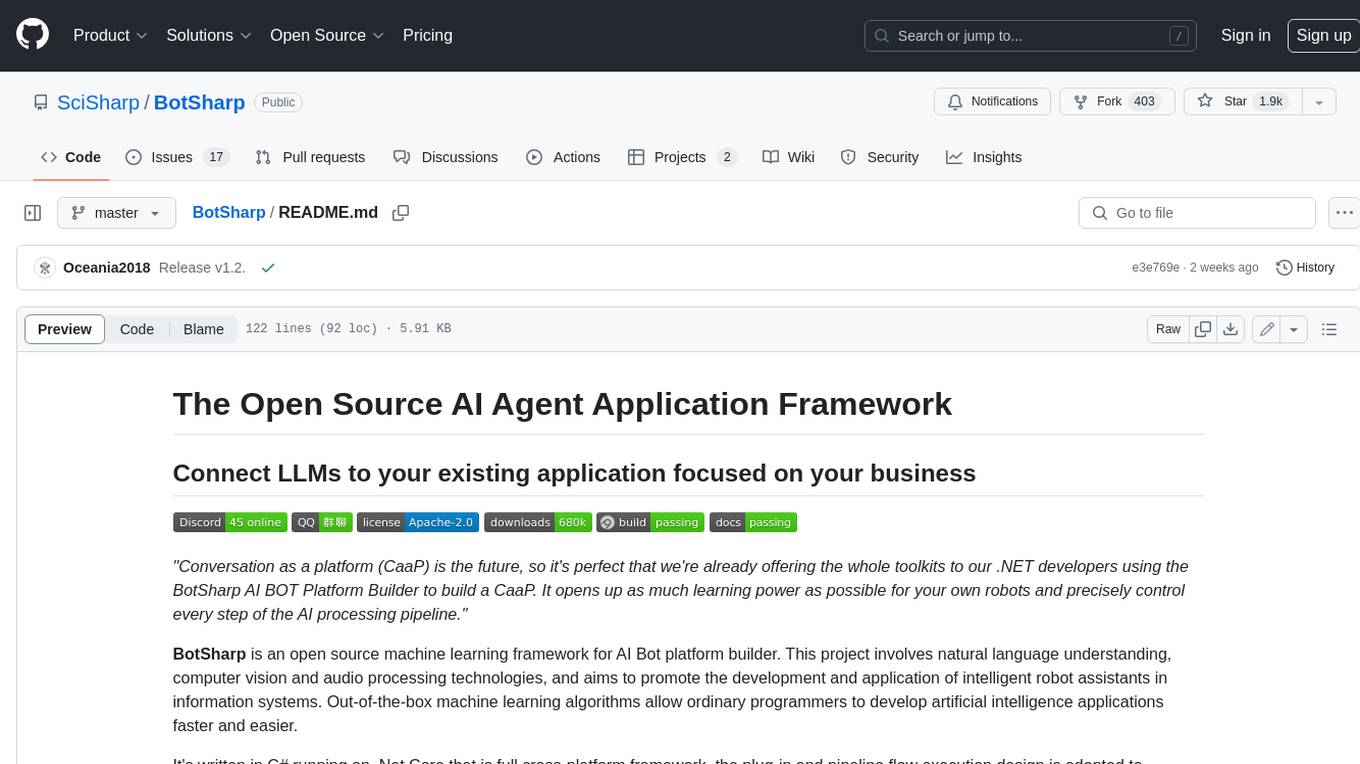
BotSharp
BotSharp is an open-source machine learning framework for building AI bot platforms. It provides a comprehensive set of tools and components for developing and deploying intelligent virtual assistants. BotSharp is designed to be modular and extensible, allowing developers to easily integrate it with their existing systems and applications. With BotSharp, you can quickly and easily create AI-powered chatbots, virtual assistants, and other conversational AI applications.
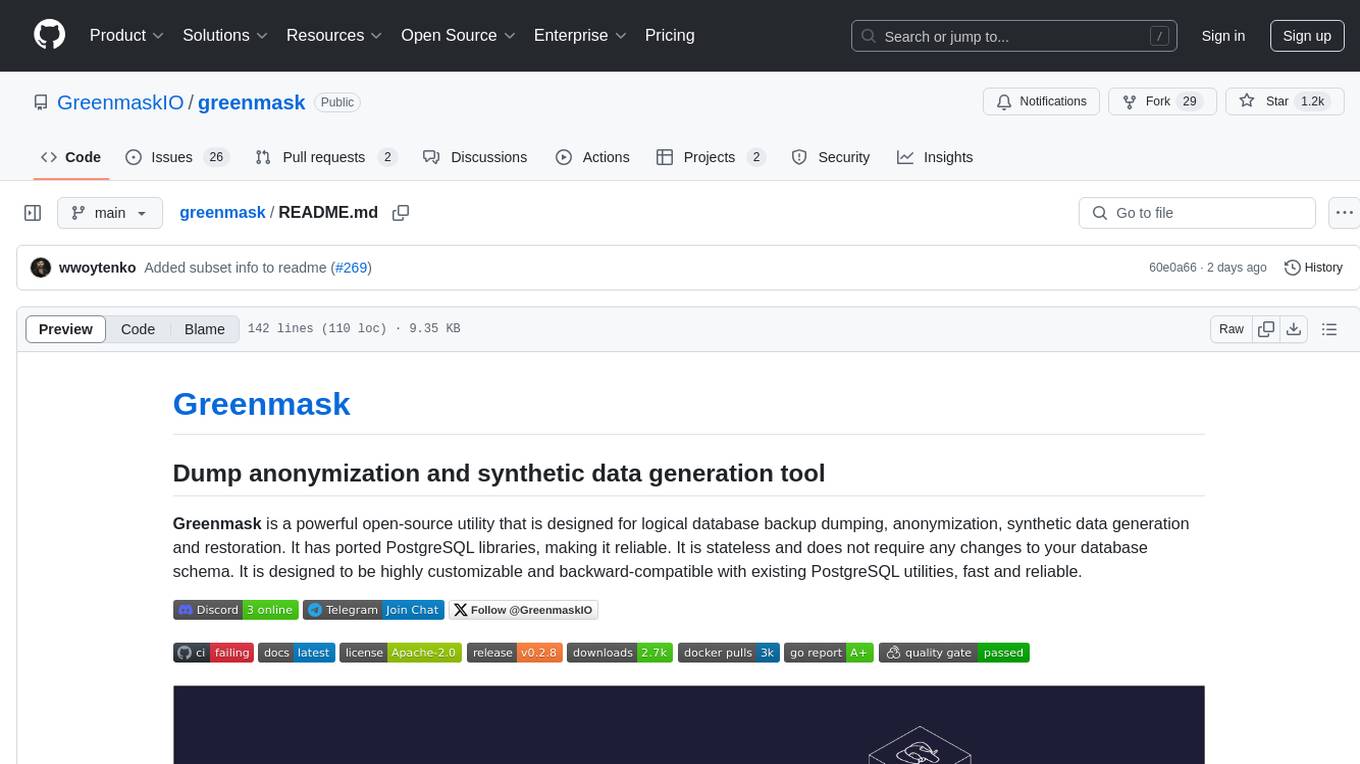
greenmask
Greenmask is a powerful open-source utility designed for logical database backup dumping, anonymization, synthetic data generation, and restoration. It is highly customizable, stateless, and backward-compatible with existing PostgreSQL utilities. Greenmask supports advanced subset systems, deterministic transformers, dynamic parameters, transformation conditions, and more. It is cross-platform, database type safe, extensible, and supports parallel execution and various storage options. Ideal for backup and restoration tasks, anonymization, transformation, and data masking.
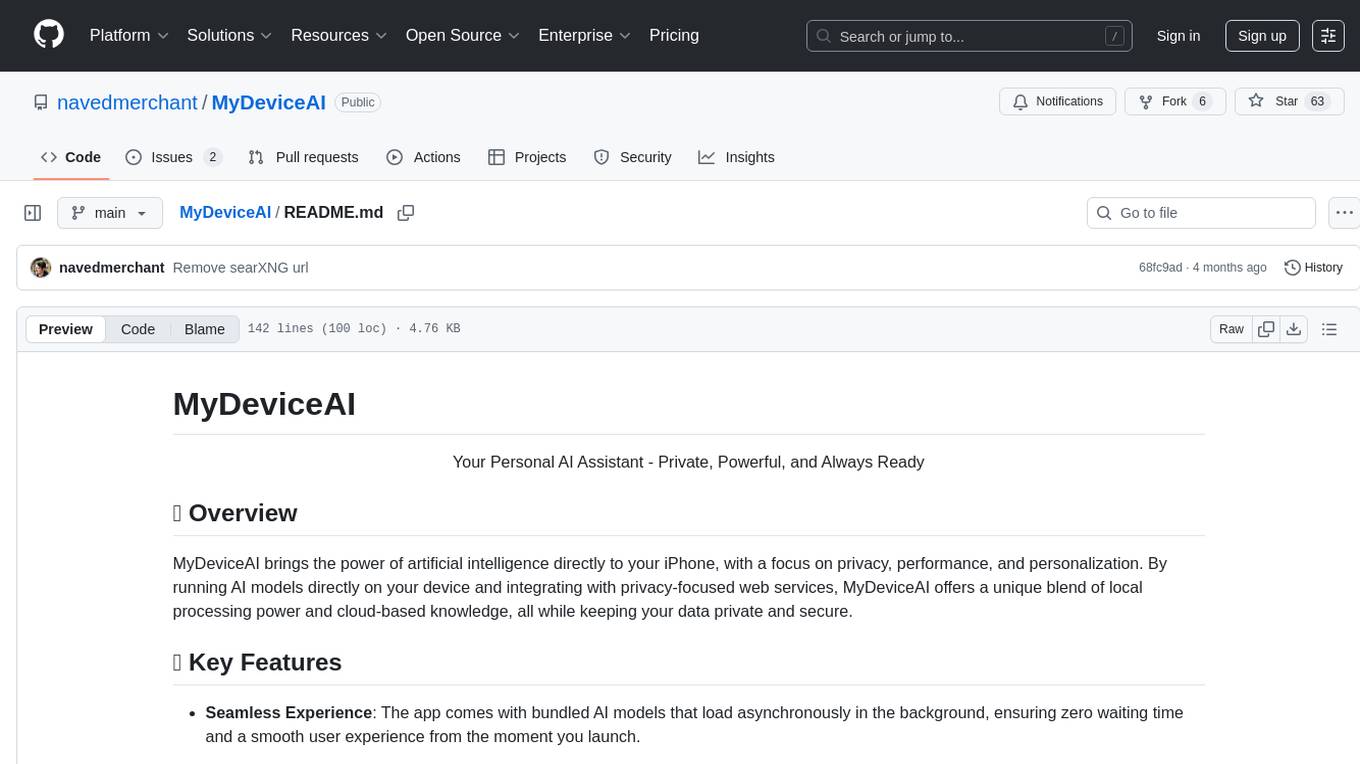
MyDeviceAI
MyDeviceAI is a personal AI assistant app for iPhone that brings the power of artificial intelligence directly to the device. It focuses on privacy, performance, and personalization by running AI models locally and integrating with privacy-focused web services. The app offers seamless user experience, web search integration, advanced reasoning capabilities, personalization features, chat history access, and broad device support. It requires macOS, Xcode, CocoaPods, Node.js, and a React Native development environment for installation. The technical stack includes React Native framework, AI models like Qwen 3 and BGE Small, SearXNG integration, Redux for state management, AsyncStorage for storage, Lucide for UI components, and tools like ESLint and Prettier for code quality.
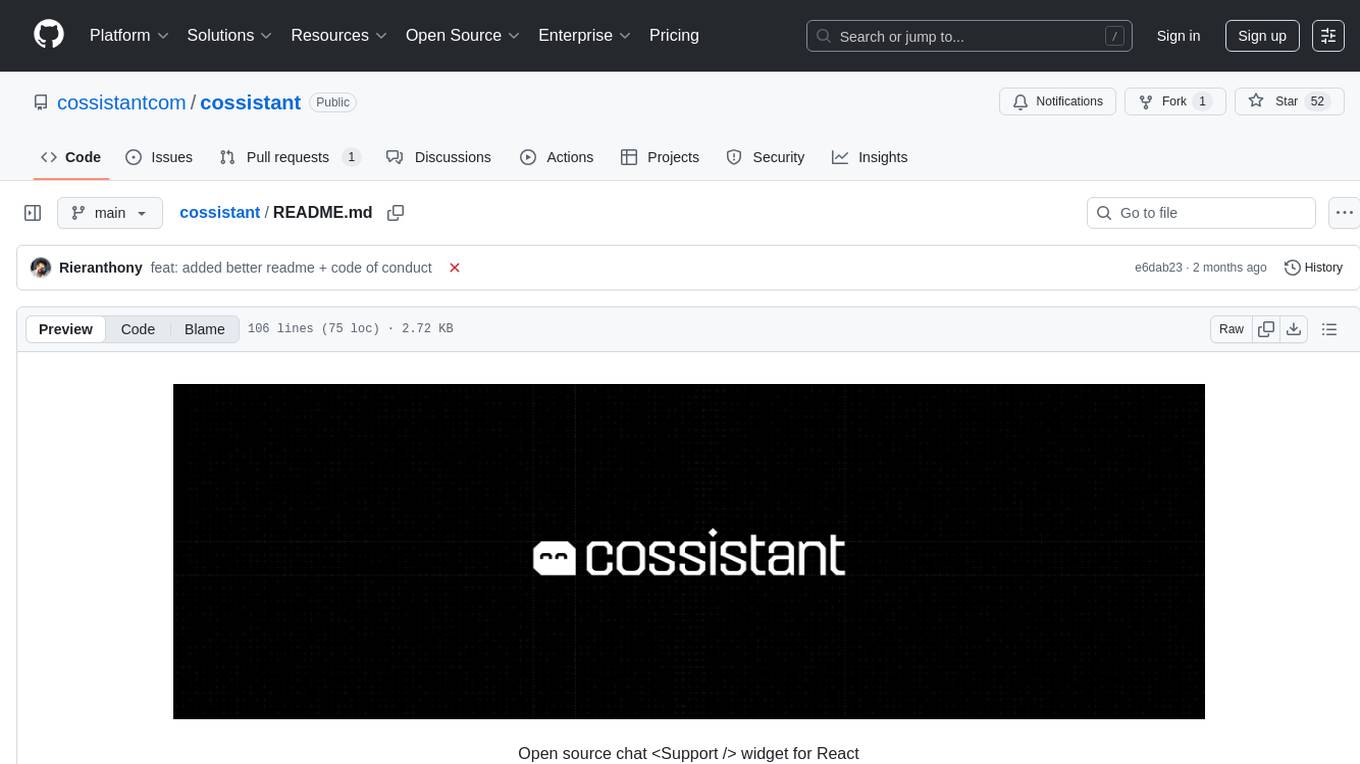
cossistant
Cossistant is an open source chat support widget tailored for the React ecosystem. It offers headless components for building customizable chat interfaces, real-time messaging with WebSocket technology, and tools for managing customer conversations. The tool is API-first, self-hosted, developer-friendly with TypeScript support, and provides complete integration flexibility. It uses technologies like Next.js, TailwindCSS, and WebSockets, and supports databases like PlanetScale for production and DBgin for local development. Cossistant is ideal for developers seeking a versatile chat solution that can be easily integrated into their applications.
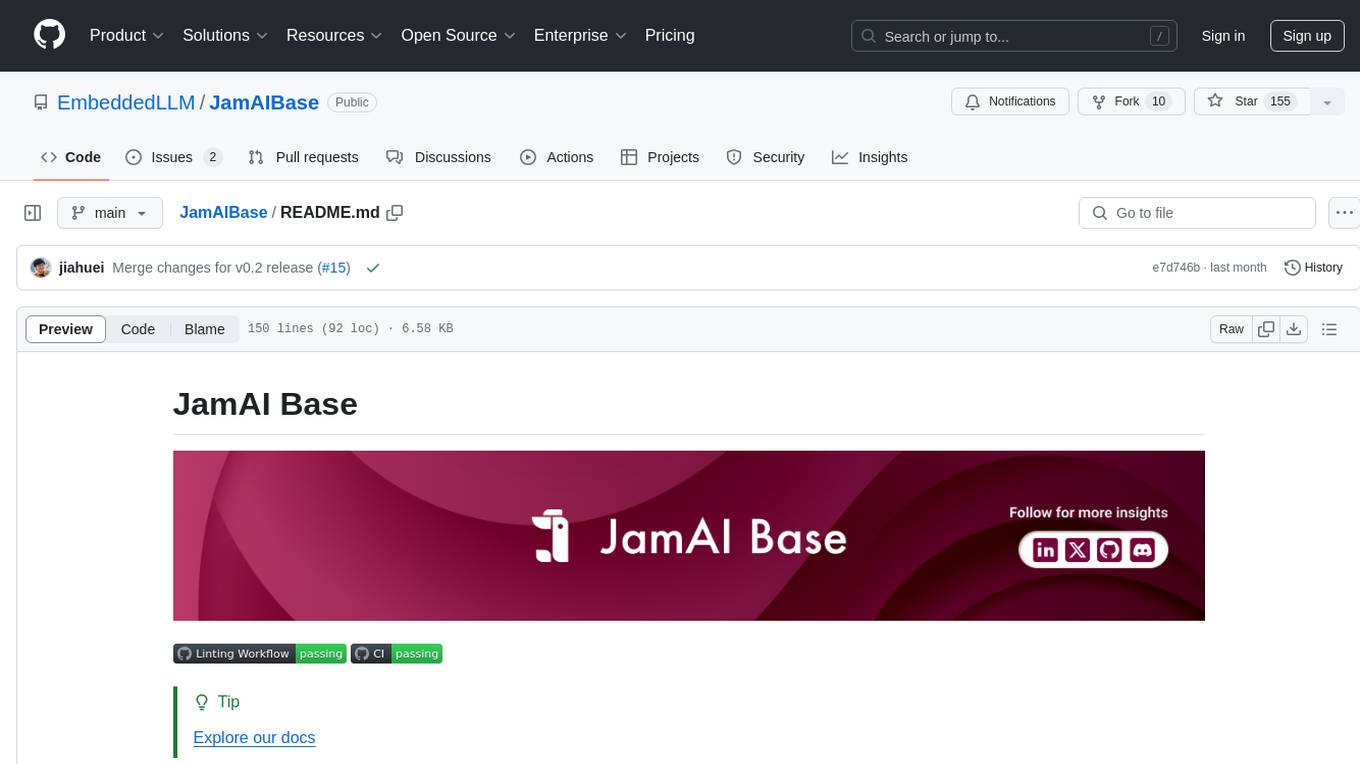
JamAIBase
JamAI Base is an open-source platform integrating SQLite and LanceDB databases with managed memory and RAG capabilities. It offers built-in LLM, vector embeddings, and reranker orchestration accessible through a spreadsheet-like UI and REST API. Users can transform static tables into dynamic entities, facilitate real-time interactions, manage structured data, and simplify chatbot development. The tool focuses on ease of use, scalability, flexibility, declarative paradigm, and innovative RAG techniques, making complex data operations accessible to users with varying technical expertise.
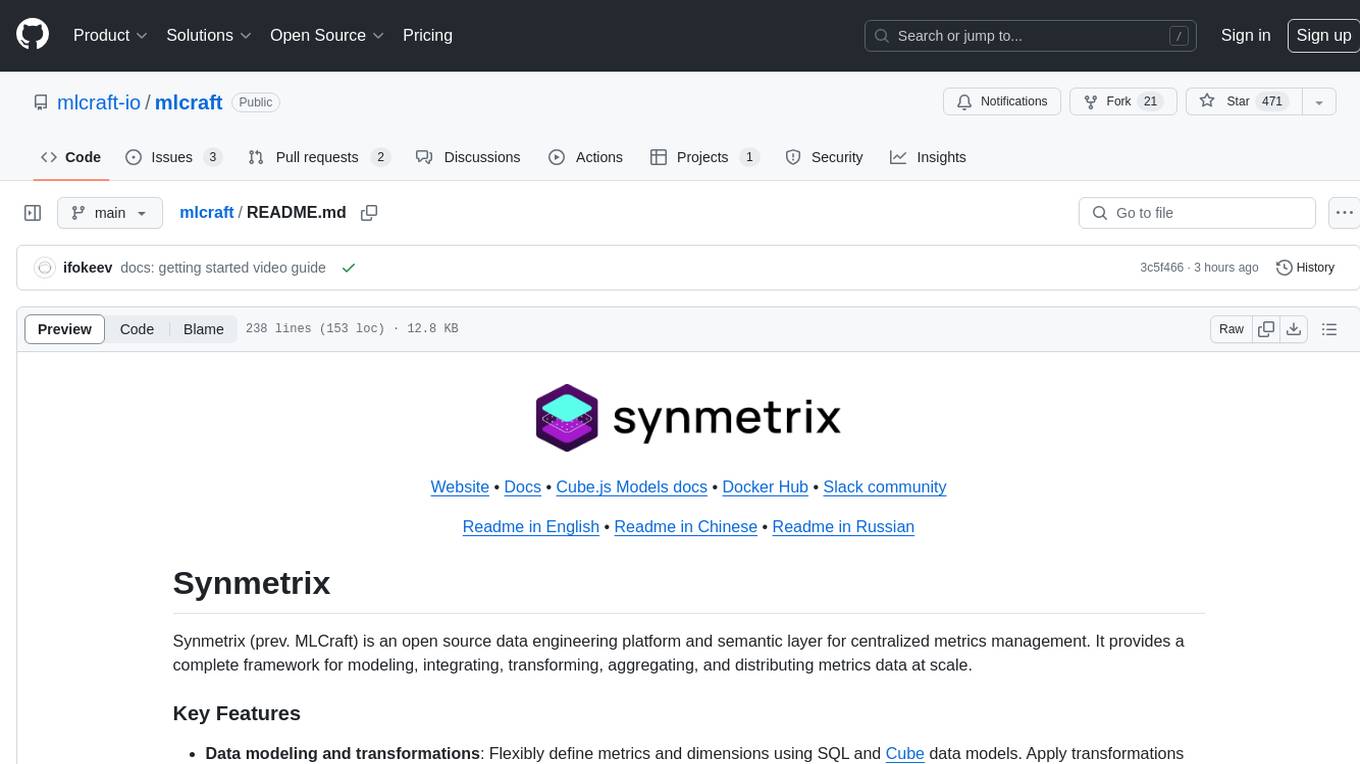
mlcraft
Synmetrix (prev. MLCraft) is an open source data engineering platform and semantic layer for centralized metrics management. It provides a complete framework for modeling, integrating, transforming, aggregating, and distributing metrics data at scale. Key features include data modeling and transformations, semantic layer for unified data model, scheduled reports and alerts, versioning, role-based access control, data exploration, caching, and collaboration on metrics modeling. Synmetrix leverages Cube (Cube.js) for flexible data models that consolidate metrics from various sources, enabling downstream distribution via a SQL API for integration into BI tools, reporting, dashboards, and data science. Use cases include data democratization, business intelligence, embedded analytics, and enhancing accuracy in data handling and queries. The tool speeds up data-driven workflows from metrics definition to consumption by combining data engineering best practices with self-service analytics capabilities.
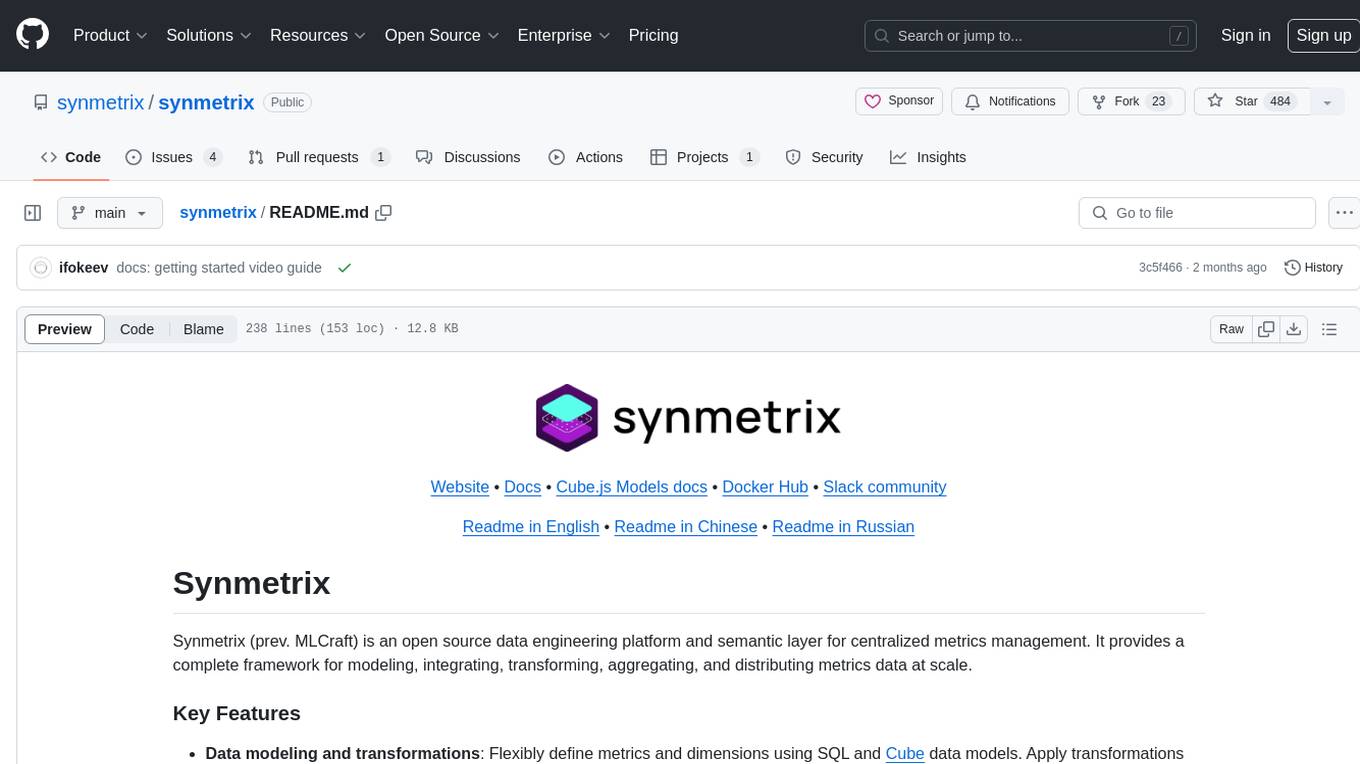
synmetrix
Synmetrix is an open source data engineering platform and semantic layer for centralized metrics management. It provides a complete framework for modeling, integrating, transforming, aggregating, and distributing metrics data at scale. Key features include data modeling and transformations, semantic layer for unified data model, scheduled reports and alerts, versioning, role-based access control, data exploration, caching, and collaboration on metrics modeling. Synmetrix leverages Cube.js to consolidate metrics from various sources and distribute them downstream via a SQL API. Use cases include data democratization, business intelligence and reporting, embedded analytics, and enhancing accuracy in data handling and queries. The tool speeds up data-driven workflows from metrics definition to consumption by combining data engineering best practices with self-service analytics capabilities.
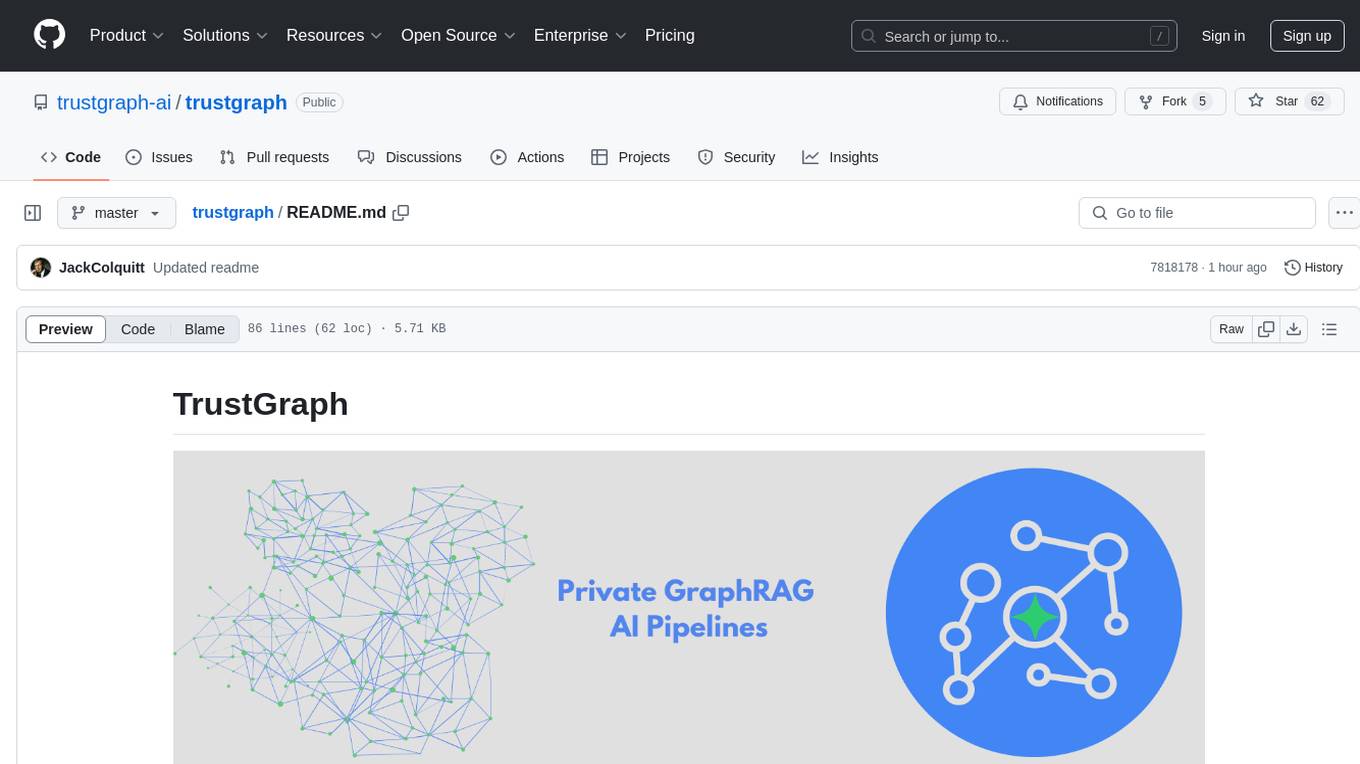
trustgraph
TrustGraph is a tool that deploys private GraphRAG pipelines to build a RDF style knowledge graph from data, enabling accurate and secure `RAG` requests compatible with cloud LLMs and open-source SLMs. It showcases the reliability and efficiencies of GraphRAG algorithms, capturing contextual language flags missed in conventional RAG approaches. The tool offers features like PDF decoding, text chunking, inference of various LMs, RDF-aligned Knowledge Graph extraction, and more. TrustGraph is designed to be modular, supporting multiple Language Models and environments, with a plug'n'play architecture for easy customization.
For similar tasks

sola-application
Sola AI is a personalized AI voice assistant that integrates Solana blockchain technology and AI through a hands-free user experience. It provides real-time communication using WebRTC, modern frontend built with Next.js and Tailwind CSS, scalable backend with microservices architecture, blockchain data filtering, and supports Solana on-chain interactions. Core components include Sola AI Application for user input processing, OpenAI integration, microservices routing, and AI-powered intelligent interface. It also includes Data Service for blockchain data processing, Wallet Service for transaction handling, and User Service for managing user data. The workflow involves receiving user input, fetching and filtering blockchain data, building transactions, executing transactions, and responding to the user. Installation involves cloning the repository, installing dependencies, setting up environment variables, and starting the development server.
For similar jobs

sweep
Sweep is an AI junior developer that turns bugs and feature requests into code changes. It automatically handles developer experience improvements like adding type hints and improving test coverage.

teams-ai
The Teams AI Library is a software development kit (SDK) that helps developers create bots that can interact with Teams and Microsoft 365 applications. It is built on top of the Bot Framework SDK and simplifies the process of developing bots that interact with Teams' artificial intelligence capabilities. The SDK is available for JavaScript/TypeScript, .NET, and Python.

ai-guide
This guide is dedicated to Large Language Models (LLMs) that you can run on your home computer. It assumes your PC is a lower-end, non-gaming setup.

classifai
Supercharge WordPress Content Workflows and Engagement with Artificial Intelligence. Tap into leading cloud-based services like OpenAI, Microsoft Azure AI, Google Gemini and IBM Watson to augment your WordPress-powered websites. Publish content faster while improving SEO performance and increasing audience engagement. ClassifAI integrates Artificial Intelligence and Machine Learning technologies to lighten your workload and eliminate tedious tasks, giving you more time to create original content that matters.

chatbot-ui
Chatbot UI is an open-source AI chat app that allows users to create and deploy their own AI chatbots. It is easy to use and can be customized to fit any need. Chatbot UI is perfect for businesses, developers, and anyone who wants to create a chatbot.

BricksLLM
BricksLLM is a cloud native AI gateway written in Go. Currently, it provides native support for OpenAI, Anthropic, Azure OpenAI and vLLM. BricksLLM aims to provide enterprise level infrastructure that can power any LLM production use cases. Here are some use cases for BricksLLM: * Set LLM usage limits for users on different pricing tiers * Track LLM usage on a per user and per organization basis * Block or redact requests containing PIIs * Improve LLM reliability with failovers, retries and caching * Distribute API keys with rate limits and cost limits for internal development/production use cases * Distribute API keys with rate limits and cost limits for students

uAgents
uAgents is a Python library developed by Fetch.ai that allows for the creation of autonomous AI agents. These agents can perform various tasks on a schedule or take action on various events. uAgents are easy to create and manage, and they are connected to a fast-growing network of other uAgents. They are also secure, with cryptographically secured messages and wallets.

griptape
Griptape is a modular Python framework for building AI-powered applications that securely connect to your enterprise data and APIs. It offers developers the ability to maintain control and flexibility at every step. Griptape's core components include Structures (Agents, Pipelines, and Workflows), Tasks, Tools, Memory (Conversation Memory, Task Memory, and Meta Memory), Drivers (Prompt and Embedding Drivers, Vector Store Drivers, Image Generation Drivers, Image Query Drivers, SQL Drivers, Web Scraper Drivers, and Conversation Memory Drivers), Engines (Query Engines, Extraction Engines, Summary Engines, Image Generation Engines, and Image Query Engines), and additional components (Rulesets, Loaders, Artifacts, Chunkers, and Tokenizers). Griptape enables developers to create AI-powered applications with ease and efficiency.